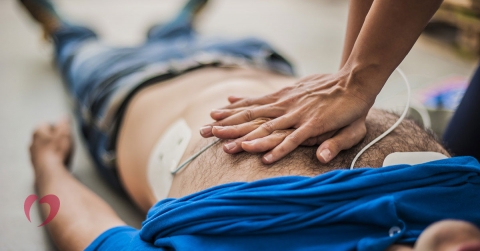Understanding Sudden Cardiac Arrest

Sudden cardiac arrest is often confused with a heart attack but is a different and much more deadly condition. In sudden cardiac arrest, the heart’s electrical system experiences a problem that causes it to completely stop beating. This quickly results in loss of consciousness and death. Only 1 in 10 people who experience sudden cardiac arrest will live.
Signs of sudden cardiac arrest
Sudden cardiac arrest comes on with little to no warning and can happen in those with no prior heart problems. It is the result of an issue with the heart’s electrical system that triggers the heartbeat. Some causes of sudden cardiac arrest are caused by ventricular fibrillation, a type of arrhythmia that begins in the ventricle and causes a chaotic heartbeat. Other causes include undetected heart problems and trauma, such as a sudden blow to the chest.
In contrast, a heart attack or myocardial infarction is a problem with blood flow to the heart. When the flow of blood to the heart is blocked, the body can be deprived of oxygen. Patients experience symptoms like chest pain and other early warning signs, and 9 out of 10 patients survive heart attacks.
Risk factors for sudden cardiac arrest
Many of the risk factors for sudden cardiac arrest are the same as those for other cardiac diseases and conditions. Risk factors include:
- Age
- History of heart disease
- Family history
- Genetic abnormality
- Obesity
- High blood pressure
- High cholesterol
- Diabetes
- Sedentary lifestyle
What to do if you witness sudden cardiac arrest
If you witness a person suddenly collapse and lose consciousness with no pulse, they could be experiencing sudden cardiac arrest. They may gasp or look as if they are having a seizure. Death can happen in a matter of minutes. Keeping blood pumping through the body is the only chance of survival and requires CPR or the use of an AED machine. CPR may give emergency medical services enough time to reach the patient and shock their heart into beating again. Using an AED machine, where available, can potentially reset the heart and is simple enough to be used by most adults.
Surviving sudden cardiac arrest is possible, though the chances of survival are low. Prevention is the key to reducing sudden cardiac arrest. Regular screenings, following your doctor’s advice regarding heart health, and reducing risk factors are important steps in preventing sudden cardiac arrest.




